What are the Pros And Cons of Solar Energy? Advantages & Disadvantages of Solar
Is this your year to switch to solar panels? Our experts explain the key pros and cons of solar energy to help you make an informed decision.
Is Solar Right For You?
Are you asking yourself, “Should I switch to solar?” If so, you’re not alone. It is a commitment to make the switch, so it is essential to make an informed decision.
But is solar energy for you?
Considering the pros and cons of solar energy is an excellent way to decide whether to make the switch. Read on to learn the advantages and disadvantages of solar energy.
Advantages of Solar Energy
Solar power uses energy from the sun to convert into electrical and thermal energy. Solar technology converts sunlight using photovoltaic (PV) panels or mirrors, which makes the energy ready to generate electricity.
There are many advantages of solar energy, which is why it is a leading renewable energy resource. Here are the top benefits:
- Reduce and eliminate energy bills
- Abundant energy resource
- Reduce your carbon footprint
- Avoid rising energy costs
- More consistent energy supply
- Reap tax benefits
- Increase property value
- Earn your investment back
- Longevity
Some of the benefits are personal benefits for you and your household. However, other advantages of solar panels also benefit those around you and planet Earth. Read on to learn the details about each of these benefits.
Reduce or Eliminate Energy Bills With Solar Panels
In 2021, the average American household spent $24,032 on common bills. One of the biggest utility bills is your electricity bill; after all, electricity is being used almost constantly when you look around your house.
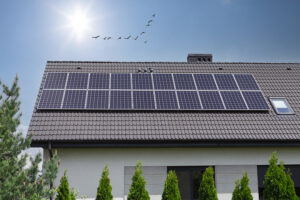
However, you can reduce or even eliminate energy bills with solar energy. Solar power helps you generate your electricity, making you less reliant on electrical utility. You can even work towards becoming energy independent, which is when you do not have any reliance on the grid and eliminate energy bills.
Solar is an Abundant Energy Resource
Did you know that one hour and a half of sunlight can handle the entire world’s energy consumption for a year? Sunlight is an abundant energy source, and as solar technology develops, so do its capabilities.
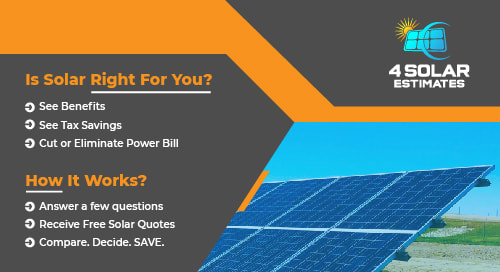
A common myth is that solar power only works with a lot of sunlight. However, solar panels can work in any climate on Earth and will generate electricity with small amounts of sunlight. Solar panels can also work in various weather conditions, which means they are accessible for most households.
Plus, solar panels have flexible installation options. Some people choose to share their solar panel source with neighbors, while others install panels on their roofs.
And the good news is that in 2019 US energy production overtook consumption, thanks to renewable resources such as solar power. Solar power lessens the strain on the electric grid and provides a reliable alternative energy resource.
Solar Energy Reduces Your Carbon Footprint
Using electricity produces greenhouse gas emissions, which are harmful to your health and the environment. Greenhouse gases trap heat in the atmosphere and contribute to extreme weather conditions. Greenhouse gas emissions also contribute to wildfires, food supply issues, and other disruptions.
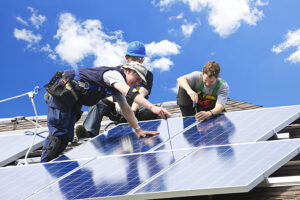
Plus, the air pollution caused by greenhouse gas emissions can cause many health issues, including respiratory disease. Everyone has to do their part to reduce their carbon footprint, which is how many greenhouse gas emissions you produce. 28% of US greenhouse gas emissions come from electricity generation.
One of the best ways to reduce your carbon footprint is to switch to a renewable energy source, such as solar power. Solar power does not directly lead to pollutants and is one of the best environmentally friendly electrical solutions. After ALL, two billion trees store as much carbon as the emissions reduced by the US solar industry.
Avoid Rising Energy Costs With Solar Installation
When you invest in solar power, you become less reliant on the electrical grid and the rising energy prices. Utility bills continue to rise for various reasons, and most of these reasons are not in your control.
However, you stay in charge of your electricity usage and prices with solar power. Not only will your utility bill be lower or non-existent, but you will avoid the stress of rising utility prices. It means you have a better understanding of your finances and can save accordingly.
More Consistent Energy Supply
One of the top advantages of solar energy is its consistency. The electrical grid experiences a lot of strain, and as previous state blackouts have indicated, other energy resources are needed.
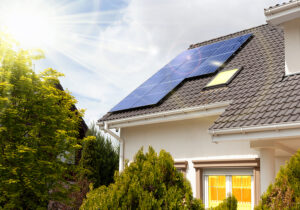
You do not have to worry about electrical blackouts or other issues with the grid, which can interrupt your day and quickly become serious.
Solar power provides a more reliable option. You can also invest in a battery system to store solar energy for backup protection. And solar technologies continue to develop to become even more efficient.
Your solar panel provider can provide information on the best solar technology to meet your electrical needs.
Reap Tax Benefits From Home Solar Systems
Since 2005 there has been a federal Solar Investment Tax Credit (ITC) to encourage people to invest in solar power. It means you can claim 26% of your solar panel installation cost on your federal taxes. While this is subject to change, this tax credit is currently in place until 2024, although the percentage may decrease.
Your solar panel provider will be able to provide information on how to claim this tax benefit. However, you may also have state benefits for installing solar. For example, some states offer upfront rebates, or you can sell your extra solar energy to the local energy utility.
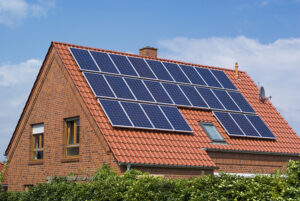
There are also subsidized loans, local utility rebates, and tax exemptions. For example, some states do not increase your property taxes with solar panel installation.
Increase Property Value
Your property’s value may also increase when you install solar panels. After all, solar power is a popular energy source, so it can be appealing to prospective buyers if it is already installed. How much value is added to your home will depend on several factors, such as:
- Local solar installation prices
- System replacement cost
- Home location
- System age and output
If a prospective buyer saves money by having a solar system already installed, your home value will likely increase. Older systems and low system outputs will reduce how much value is added to your property.
Studies have found home value can increase by up to 4.1% compared to those without solar panels. And as environmental awareness increases, so do buyers’ desires to find sustainable homes, which could be yours in the future.
Earn Your Investment Back
Solar panels are investments with solid rates of return; you get tax incentives, reduce or eliminate utility costs and avoid rising prices. And solar panels are cheaper than ever, which means even the installation cost is more accessible.
Various factors impact your solar panel payback period, including:
- Electrical generation
- The gross cost of the system
- Available financial incentives
- Average electrical use
However, the payback time for solar panels can be as little as six years. And by ten years, most people have paid off their solar panels.
And then? You can continue to reap the benefits of this invaluable investment.
Longevity
Another pro of solar energy is how long it lasts. If you use a reputable solar panel provider, your solar panels can last around 30 years. And as technology continues to develop, this number is also likely to increase.
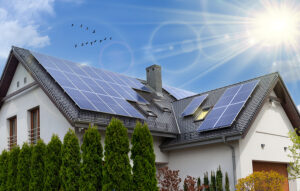
Even after their expected lifespan, solar panels can continue to produce energy, but their output may decrease significantly. It can depend on the type of solar panels you install and their panel degradation rate. However, you can reap the return on your investment for many years.
Other factors that impact the lifespan of your solar panels include:
- The climate
- Installation quality
- Maintenance
A reputable solar panel provider will offer a warranty for around the length of the panel’s lifespan. While maintenance is essential to increase solar panel longevity, it is usually minimal and just involves cleaning. This is because there are no moving parts in the solar system, and if panels are installed on a tilt, often debris will wash off by itself.
Your solar panel provider will specify maintenance tips for your solar panels. However, usually, you should clean your solar panels two to four times a year.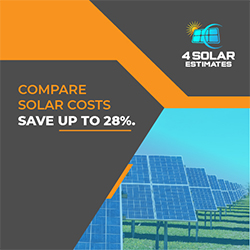
Support the US Economy
If you invest in solar panels, you are also supporting the US economy and not relying on foreign fossil fuels. As of 2020, over 230,000 Americans were working in solar. And the industry generated more than $33 billion of private investment in the US economy.
If you invest in solar panels, you support local and countrywide industries. And as demand grows for solar power, so does its potential, with the industry expanding into new markets and providing even more systems.
Disadvantages of Solar Energy
While solar energy has many advantages, it is also important to know the disadvantages. You can then weigh up the pros and cons of solar energy to make an informed decision. Here are the cons of solar energy:
- Installation expense
- Night electricity needs
- Solar energy is a long term investment
- Not all roofs work
Weigh up the pros and cons of solar energy. You need to determine if the advantages of solar energy outweigh the cons for you or vice versa. The decision to invest in solar energy is different for everyone.
Solar Initial Installation Expense
If you pick a reputable solar panel provider and the correct type of panels, you will reap the rewards. However, for some people, the initial installation cost may not be worth it.
It is best to speak to a solar panel provider directly to discuss your budget and if there are any payment plans available. Payment plans can help you with the initial installation cost and ensure you can still get solar panels.
Night Electricity Needs
If you are not connected to the electrical grid, you need to invest in the right solar technology to continue to use it at night. Solar panels cannot produce sufficient energy at night, so it is vital to have energy storage devices that enable you to use the electricity produced during the day at night.

Energy storage devices are also an investment, so you have to weigh up if you want to commit to the investment. Some people begin by staying connected to the electrical grid and gradually working toward energy independence. There are many different ways to work with solar energy.
Solar Energy Is Not a Short-Term Investment
If you are about to move homes, installing solar panels does not make sense. Solar energy is a long-term investment with many benefits, but not many you will see if you will quickly move out after installation.
Solar panels are hard to move once you install them, and are customized for your roof, so once you install them, it is hard to change your mind or move them to your new home.
If you plan to stay in your home, for the time being, you will reap the advantages of solar panels, such as the potential to increase your home value.
Not All Roofs Work Well With Solar
When people think about solar panels, they often think about the installation being on the roof. However, not all roofs are suitable for solar panels, as panels need a mounting system to work. Homes with older tiles, apartments with skylights or decks, and other roof types may not be able to install solar panels.
However, you can have a community solar garden in your neighborhood or choose ground-mounted solar panels instead.
The Pros and Cons of Solar Energy
Now you know the pros and cons of solar energy, which can help you decide whether to make the switch. It is a personal decision to switch to solar energy, and the reasons people switch vary. Take your time to decide and talk to others who have made the switch.
It can also be helpful to do further research or schedule a consultation with a solar panel provider. We offer a solar panel installation guide and cost guide to help you on your solar energy journey. Contact us to learn more.